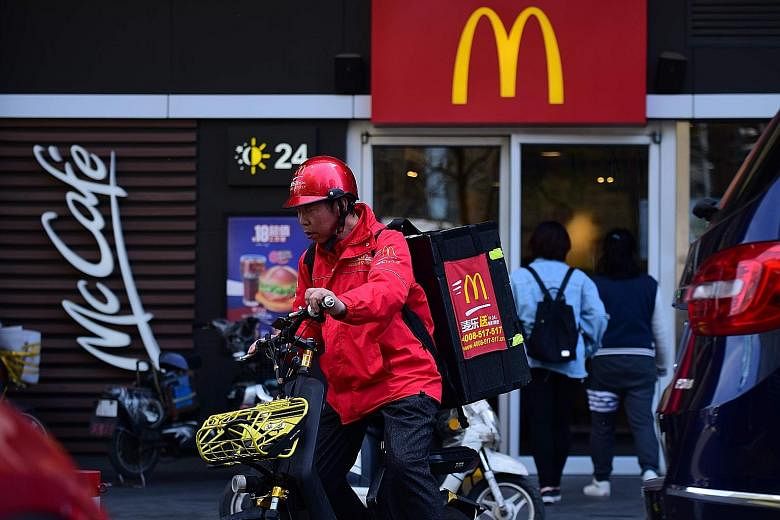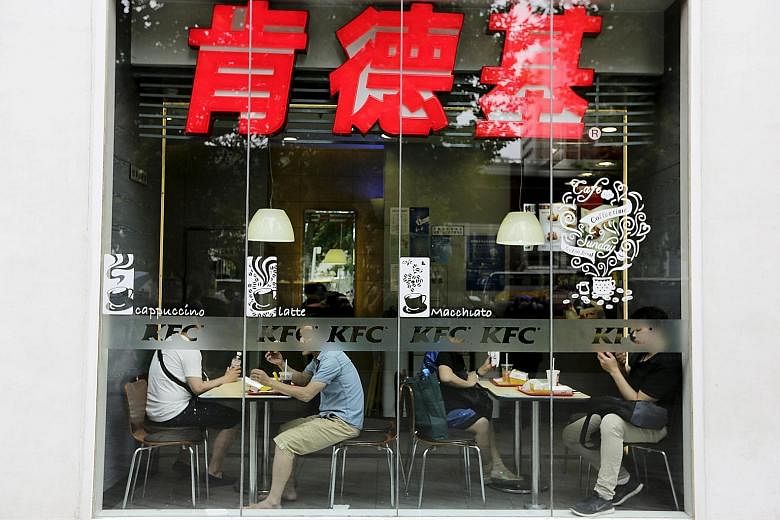BEIJING • The messages began to pop up on Chinese social media as the trade spat with the United States sizzled, urging people to boycott McDonald's and other American firms to "defend the economic Great Wall".
US President Donald Trump's tariffs on Chinese goods have roused nationalist sentiments in the world's second-largest economy, where consumers have a long track record of spurning foreign products when political nerves are frayed.
Appeals to shun the likes of McDonald's, KFC and Apple's iPhone have appeared on the popular WeChat messaging app and the Weibo microblogging site in recent days.
"Compatriots, our motherland is going through a difficult time. We must unite to support our national brands and help defend the economic Great Wall!" read one message being circulated on WeChat.
The original source of the message could not be verified.
On Weibo, a car salesman from north-west China's Gansu province wrote: "The US has fired the first salvo in this trade war.
"It's everyone's responsibility to boycott American goods!"
The Chinese government has hit back at US tariffs and vowed to retaliate against any new measures, but President Xi Jinping and Mr Trump delivered conciliatory words last week that raised hopes of a negotiated solution.
China's state-run Global Times tabloid has encouraged the government to take a tough stance, with a recent editorial saying China should fight with the same spirit as during the Korean War - one that "fears no sacrifice or loss".
"Chinese living across the globe have considerable purchasing power. We can cause a lot of damage to the US economy," wrote one reader in the article's online comment section.
But it may be tough to convince Chinese people to give up American brands that have become ubiquitous in streets and shopping centres across the vast country.
The calls for boycotts certainly did not ruin the appetite of the lunch crowd at a McDonald's outlet in downtown Beijing last week, just a stone's throw away from the Ministry of Foreign Affairs.
"I also received these messages, I just deleted them," said diner Wang Zhiyi, who was wolfing down a double cheeseburger with fries and Coke. "These people (who share such messages) just want to cause a ruckus."
That was not the first time American products have been targeted by boycotts.
Photos of people smashing their iPhones emerged on social media in 2016, purportedly to denounce US support for the Philippines in a territorial dispute with China over the South China Sea.
Protesters also shouted slogans in front of a dozen KFC outlets.
But Mr Ben Cavender, an analyst at Shanghai-based China Market Research Group, said he did not expect a boycott to gain much traction this time.
"Despite online slogans, surveys show that service brands that employ mostly Chinese nationals are viewed more positively," Mr Cavender said.
Although many were quick to brush aside nationalist slogans, American wine has taken a hit.
"I've had a couple of corporate clients who've said they'd prefer to switch from a US wine to something else (for official events) in recent weeks because they are conscious of the image they are projecting," said Beijing-based wine consultant Jim Boyce.
According to the California Wine Institute, China was the fifth-largest importer of wine from the state last year.
While China's new 15 per cent tariff on US wine, announced early this month, is threatening to make it less price-competitive, the nationalistic fervour could deal an even bigger blow, Mr Boyce said.
"The biggest concern is whether this negativity would turn into a long-term sentiment," he said.
AGENCE FRANCE-PRESSE


